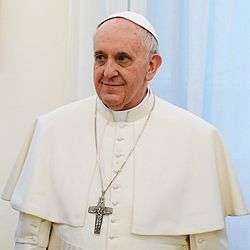pāvests
Latvian

Pāvests Francisks
Etymology
Borrowed from Middle Low German pāwest (“Pope”) (cf. German Papst), from an earlier pāwes (with an intrusive final t), borrowed from Old French papes, also borrowed from Medieval Latin pāpa (in use for the bishop of Rome since the 5th century), itself borrowed from Ancient Greek παπάς (papás), παππάς (pappás, “priest”) (< “father”). In Latvian, this loanword is first mentioned in 17th-century dictionaries.[1]
Pronunciation
- IPA(key): [pāːvɛsts]
Noun
pāvests m (1st declension)
- Pope (the bishop of Rome, the head of the Catholic Church and ruler of the Vatican City State)
- Romas pāvests ― the Roman Pope
- pāvesta vara ― papal power
- pāvesta legāts, nuncijs ― papal legate, nuncio
- pāvests Francisks, pašreizējais pāvests ― Pope Francis, the current pope
- katoļu baznīcas galvas, pāvesti Adrians VI, Klements VII un Pāvils III, neparko nedeva piekrišanu karaļa Henrija VIII laulības šķiršanai ― the heads of the Catholic Church, popes Adrian VI, Clement VIII and Paul III, did not in any way give consent to King Henry VIII's divorce
Declension
Declension of pāvests (1st declension)
| singular (vienskaitlis) | plural (daudzskaitlis) | |
|---|---|---|
| nominative (nominatīvs) | pāvests | pāvesti |
| accusative (akuzatīvs) | pāvestu | pāvestus |
| genitive (ģenitīvs) | pāvesta | pāvestu |
| dative (datīvs) | pāvestam | pāvestiem |
| instrumental (instrumentālis) | pāvestu | pāvestiem |
| locative (lokatīvs) | pāvestā | pāvestos |
| vocative (vokatīvs) | pāvests | pāvesti |
References
- Karulis, Konstantīns (1992), “pāvests”, in Latviešu Etimoloģijas Vārdnīca (in Latvian), Rīga: AVOTS, →ISBN
This article is issued from
Wiktionary.
The text is licensed under Creative
Commons - Attribution - Sharealike.
Additional terms may apply for the media files.